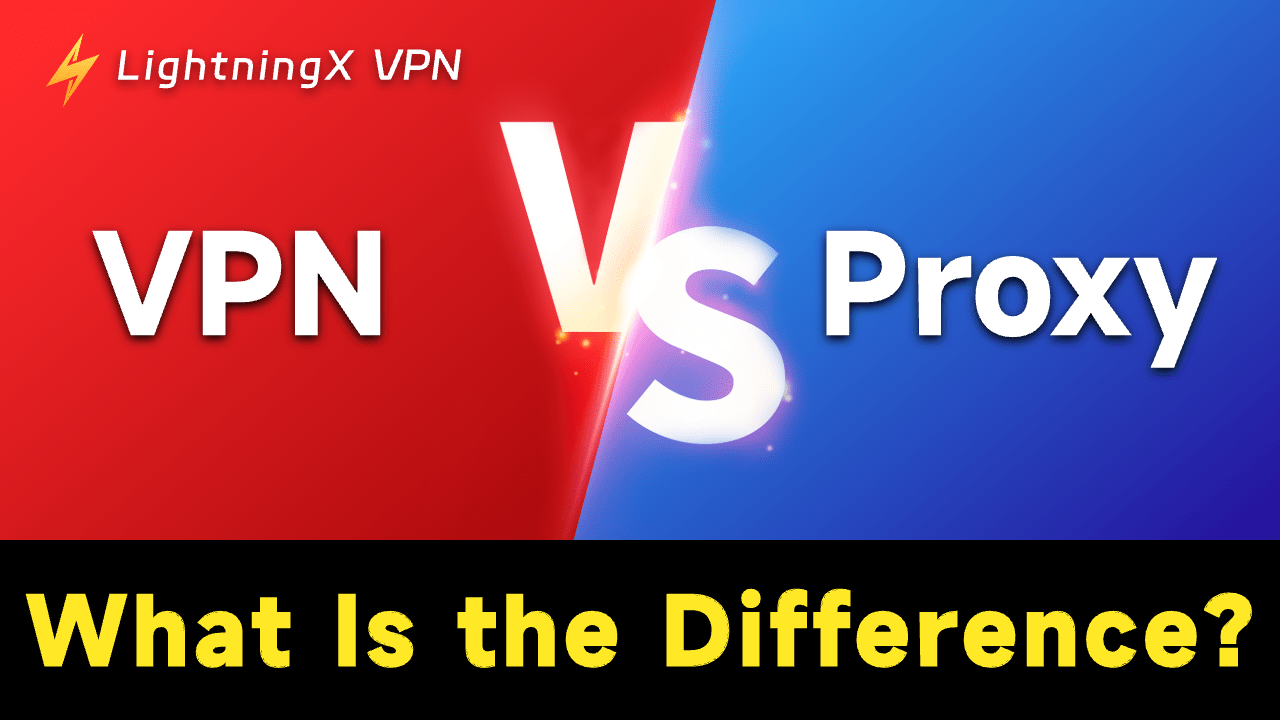Due to the increasing number of online fraud or information theft, network security is becoming increasingly important. Many people want to buy a proxy server or VPN to protect their security, but they can’t differentiate between them. Maybe you too!
So, Proxy vs VPN: which one is better?
This article will explore the working principles of proxy vs VPN, the types, advantages and disadvantages, and usage scenarios of proxy servers and VPNs to help you better understand the two and make a wise choice.
What is a Proxy Server?

Proxy Server acts as a bridge between you and the internet. When you use a proxy server, your Internet activity is translated to the proxy’s IP address instead of your own. So, how do proxy servers work?
In simple terms, when you send a request to visit a website, the proxy server intercepts the request, grabs the website data, and sends it back to you.
This can help protect your personal information and make your online life safer.
Types of Proxy Server
A proxy server is a relay station between you and the Internet. Let’s analyze the different types of proxy servers:
Based on functionality:
- Forward proxy: A forward proxy intercepts your requests and decides whether to allow them through.
- Reverse proxy: A reverse proxy is a bodyguard for your web server. It sits before the server, protects them from direct attacks, and handles traffic.
Based on accessibility:
- Public proxy: Anyone can use a public proxy. While it’s free and simple, it’s also less secure.
- Private proxy: Only authorized users can access a private proxy. This is more secure, but usually costs money.
Based on privacy:
- Anonymous proxy: Hides your IP address, making it harder for websites to track you.
- High anonymity proxy: Takes extra steps to hide your identity, such as encrypting your data multiple times.
- Transparent proxy: Does not hide your IP address, but can be used to control or monitor your Internet traffic.
Based on location:
- Residential proxy: Assigns an IP address associated with a real home or business.
- Datacenter proxy: Located in a data center, it provides high-speed connections but may have lower privacy.
Based on additional features:
- Rotating proxies: Assign a different IP address to each request, making it harder to block.
- SSL proxies: Encrypt your data, providing a secure connection.
- TOR proxies: Direct your traffic through a network of computers, making it very difficult to track.
Read more: 10+ Best Proxy Sites and Free Proxy Server to Unblock Websites!
What is a VPN?

VPN, aka Virtual Private Network, is a tool that creates a secure and private connection on the Internet. It creates a secure tunnel that protects your data when it travels from your device to a remote server.
- Encryption: A VPN encrypts your data, making it unreadable to anyone who might intercept it.
- IP Address Hiding: When you connect to a VPN server, it hides your real IP address and replaces it with the IP address of the VPN server.
Types of the VPN
1. Personal VPN: Personal VPNs protect your personal information and keep your online activities private.
2. Site-to-Site VPN: Site-to-site VPNs allow employees in different locations to share resources securely.
3. Remote Access VPN: Provides a secure connection for remote workers to access files and resources on their work network.
In summary, VPNs help you browse the internet securely by encrypting your data and hiding your IP address.
Proxy vs VPN: What are the Differences?
Now, you know about proxies and VPNs. On the surface, proxies and VPNs seem similar but have many differences.
1. Proxy vs VPN: Security
Proxy services: While proxies can hide your IP address from websites, they generally do not encrypt your data. This means that your internet service provider (ISP) can still monitor your internet traffic or potentially intercept it by hackers.
VPN: A VPN encrypts your entire internet connection, making it virtually unreadable to interceptors. This provides a higher level of security and privacy, especially when dealing with sensitive information.
2. Proxy vs VPN: Speed
Proxy services: This can be slow, especially if it’s a free proxy or is heavily used by many people simultaneously.
VPN: VPNs can also slow down your connection, especially when you use a free VPN or connect to a geographically distant server. However, Paid VPNs often have optimized server networks, such as LightningX VPN, to minimize latency and ensure fast connections.
3. VPN vs Proxy: Outgoing Traffic
Proxy services: Hide the IP addresses of the websites you visit.
VPN: VPNs hide your IP address and encrypt your data. This provides higher privacy and security, making it harder for third parties to track your online activity.
4. Proxy Server vs VPN: Incoming Traffic
Proxy: Reverse proxies can manage and distribute incoming traffic to multiple servers, preventing overloads and improving performance.
VPN: VPNs focus primarily on outbound traffic, allowing only authorized traffic to enter your network. This provides security and control over who can access your resources.
5. Proxy vs VPN: Load Balancing
Proxy: Can act as a load balancer to distribute web requests and prevent server overload.
VPN: VPNs do not have built-in load-balancing capabilities. They are primarily designed to secure and encrypt your internet traffic.
In summary, while both proxies and VPNs can offer certain benefits, VPNs generally provide higher security and privacy due to their encryption capabilities. A proxy may be sufficient if your primary concern is just hiding/changing your IP address. However, for strong security and privacy protections, a VPN is the better choice.
Quick Table about Proxy vs. VPN
| Criteria | Proxy Services | VPN |
|---|---|---|
| Security | No encryption. | It can be slow, especially free proxies. |
| Speed | It can slow down but be minimized by good providers. | It can slow down, but minimized by good providers. |
| Outgoing Traffic | Hides IP addresses. | Hides IP and encrypts data. |
| Incoming Traffic | Manages and distributes traffic. | Allows only authorized traffic. |
| Load Balancing | Acts as a load balancer. | No load balancing capabilities. |
VPN vs. Proxy: Which One is a Better Choice?
Now, you know the difference between proxy and VPN. So, which one is a better choice? Let’s break it down.
Why you should use a VPN:
- Full coverage: VPNs unblock all websites and apps.
- Encryption: VPNs encrypt your entire web traffic, not just your IP address.
- No logging: Most VPNs don’t log your traffic.
- Faster speed: VPNs offer faster speeds compared to proxy servers.
Related: 5 Best No-Log VPNs: The Most Private VPN Service
When you shouldn’t use a VPN:
- One-time use: If you only need it once, a proxy server is simpler and cheaper.
- Cost: While some VPNs are free or offer trials, most are paid and more expensive.
Why you should use a proxy server:
- Single site/app: A proxy server is simpler if you need to hide your IP for only one website or app.
- Free: Many proxy services are free or cost-effective.
When you shouldn’t use a proxy server:
- No encryption: Your ISP can still see your online activity.
- Logging and selling data: Proxy servers often log your web activity and may sell it to third parties.
- Limited coverage: Proxies only work for a single website or app, not your entire internet activity.
In summary, a VPN is the better choice if you need comprehensive security and privacy for all your online activities. However, if you only need to hide your IP address for a single website or app and want a more affordable solution, a proxy server will do the trick.
Whether to choose a proxy server or a VPN depends on your needs.
Do You Need Both a Proxy and a VPN?
When choosing between a proxy server and a VPN, you may wonder if you need both. No!
If you need a more secure and smoother network environment, we recommend using a VPN.
Premium VPN can perform all the functions of a proxy and even more. Although you can use proxy extensions to quickly change IP addresses, if you already have a VPN, buying a proxy server is unnecessary.
If you are looking for a reliable and efficient VPN service, LightningX VPN may be a good choice. It uses advanced encryption protocols to ensure data transmission security. It has servers in more than 50 countries worldwide, with fast and stable connections. Unlimited bandwidth and traffic. Download LightningX VPN to get 7-day free trial.
FAQ about Proxy vs VPN
1. Is a proxy server the same as a VPN?
No, proxy servers and VPNs are not the same. While a proxy server only masks the IP address of a single website or web app, a VPN encrypts all of your web activity, providing higher security and privacy.
2. Are Proxy Servers Safe?
Yes, proxy servers are safe for avoiding viruses, but they may not be ideal for protecting your privacy. Many free proxy servers may share and sell your data to third parties.












